Key takeaways:
- Reparations politics involve addressing historical injustices and promoting healing, requiring an understanding of the needs of affected communities.
- Advocacy is crucial for amplifying marginalized voices and transforming personal stories into powerful narratives that drive legislative momentum and public awareness.
- Effective activism relies on coalition-building, storytelling, and continuous education to counter misinformation and foster community support.
- Sharing personal experiences in advocacy can unify diverse voices, challenge perceptions, and inspire collective action towards reparations.

Understanding reparations politics
Reparations politics delve into the complex history of injustice and inequality, aiming to address the wrongs of the past. I often reflect on how these discussions evoke deep emotions, sometimes sparking frustration or hope among those involved. When I consider why reparations matter, I can’t help but wonder, what does justice look like for those who have suffered from systemic oppression?
At times, I’ve felt overwhelmed by the magnitude of the topic. It’s not just about financial restitution; it’s about acknowledging historical traumas and fostering a sense of belonging. For instance, when I listened to a survivor share their story, I realized that reparations symbolize a commitment to healing and reconciliation, not just a transaction.
The various approaches to reparations can be quite different. Some advocate for direct payments, while others focus on community investments or land restitution. This diversity often raises questions: How can we create a reparative framework that genuinely reflects the needs and struggles of affected communities? In my experience, it’s crucial to approach these conversations with both an open mind and a sincere commitment to understanding the historical context behind the call for reparations.
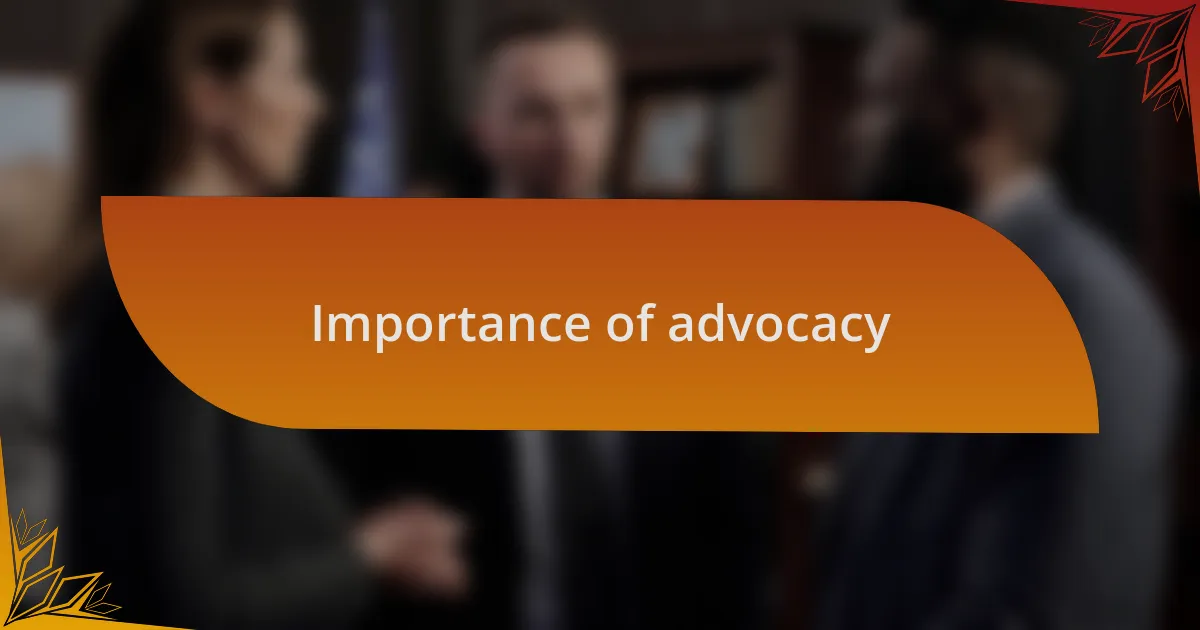
Importance of advocacy
Advocacy plays a pivotal role in the reparations movement, serving as the voice for marginalized communities whose stories often go unheard. I remember attending a town hall meeting where advocates passionately articulated the need for reparations, and it struck me how their energy brought life to an otherwise abstract concept. It became clear that without advocacy, the narratives around reparations risk fading into silence, lost among a sea of political discourse.
Every campaign needs champions who can engage the public and drive awareness. During my own journey, I discovered that sharing personal stories is one of the most potent tools in advocacy. I recall a powerful moment when a participant detailed their family’s struggles due to systemic inequality. The room was filled with raw emotion, making everyone reflect: How can we ignore the cries of those who have endured so much? The weight of such testimonies underlines the necessity of advocacy in this dialogue—it transforms statistics into personal realities.
Moreover, advocacy fuels legislative momentum by bringing together diverse perspectives and fostering understanding. I once connected with a group of activists from different backgrounds, each contributing unique insights into reparations. Through our discussions, I realized that advocacy isn’t just about pushing for policy change; it’s about uniting voices to create a collective vision for justice. It raised an important question for me: What does it take for all of us to truly acknowledge and support this movement? The answer lies in sustained advocacy that champions equity and healing across our society.
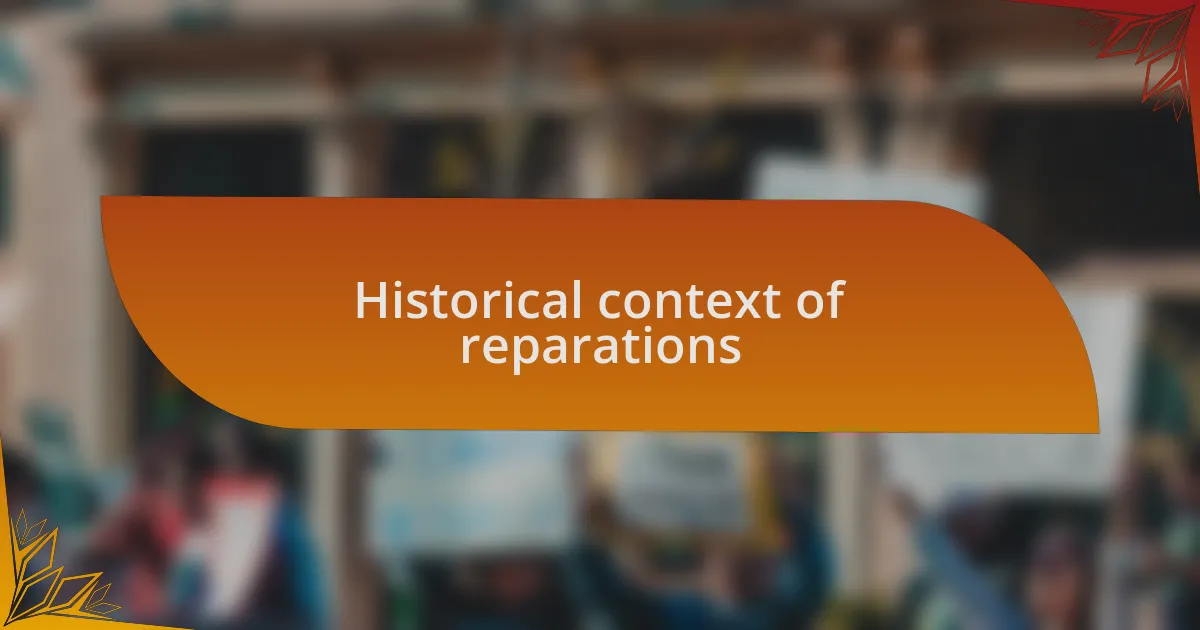
Historical context of reparations
Reparations have a deep historical context that stretches back centuries, extending from the transatlantic slave trade to contemporary struggles for racial justice. I was once moved by a discussion on how countries like Germany have taken steps to reconcile with their past atrocities, which made me reflect: Why hasn’t the U.S. pursued a similar path? Understanding these precedents can illuminate why reparations are not just a modern concept but a necessary extension of justice for those affected by historical wrongdoings.
The abolition of slavery marked a significant turning point, yet the promise of reparations never materialized for many freed individuals. As I researched this topic, I came across the story of the Freedmen’s Bureau, established to assist formerly enslaved people, which highlights the initial attempts to rectify the injustice. It saddens me to think that despite such efforts, systemic inequities persisted, leaving many to question whether reparations are merely a dream or a tangible possibility for future generations.
Within my explorations, I learned about various reparations movements globally, such as the 1980s push for reparations by Japanese Americans interned during World War II. This movement serves as a poignant reminder that actions can indeed follow acknowledgment of historical grievances. I can’t help but ask: How might today’s activists draw inspiration from these past victories to shape a robust dialogue around the reparations movement? The lessons from these historical contexts intricately weave into the fabric of our current efforts, underscoring the urgency and importance of addressing these long-standing injustices.
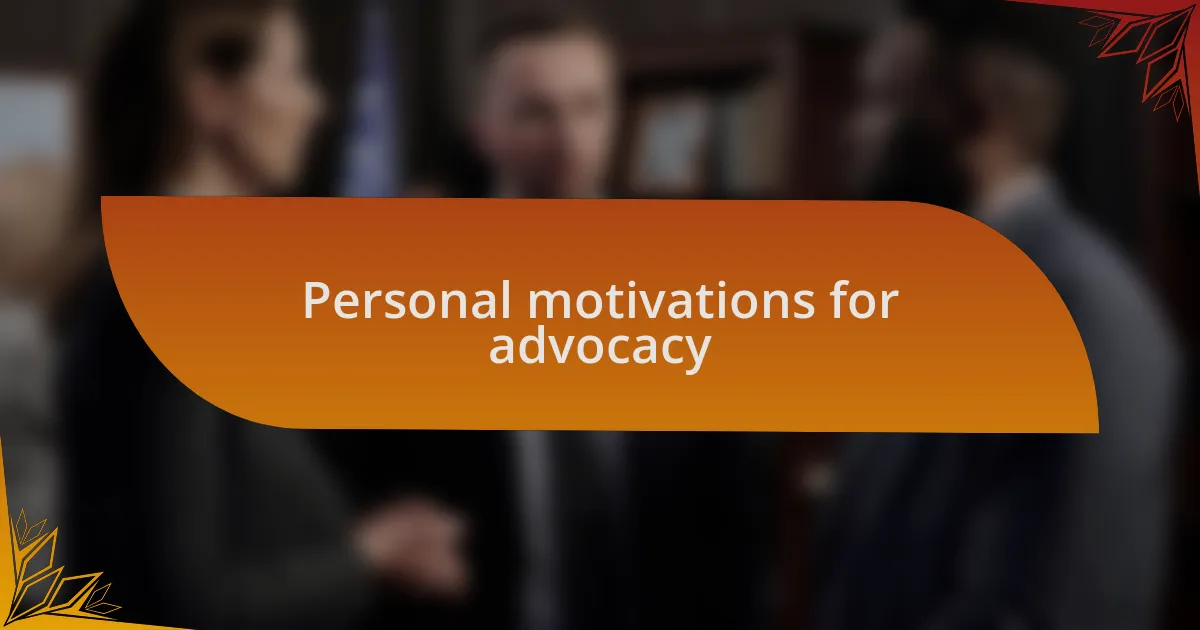
Personal motivations for advocacy
As I reflect on my personal motivations for advocating for reparations, I can’t help but feel the weight of historical injustices. Growing up in a community where stories of resilience and hardship were frequently shared, I witnessed firsthand how the past can affect present lives. Engaging with these narratives fueled my passion; I wanted to honor those struggles by advocating for a future where equity is more than just an ideal.
I vividly remember a conversation with a close family member who expressed frustration at the continuous cycle of systemic racism. Their voice cracked as they recounted their own experiences with discrimination. That moment struck a chord with me; it became clear that advocating for reparations was not just about policy but about healing wounds that run deep within families, communities, and our society as a whole. How can we build a future if we don’t confront the pain and injustices of the past?
Ultimately, my drive to advocate is fueled by a blend of empathy and urgency. The overwhelming sense of duty to enhance the lives of those still impacted by historical wrongs ignites my passion. I often ask myself, what role can I play in this movement? I believe that by actively participating, I can contribute to a collective effort aimed at addressing inequities, promoting understanding, and fostering a culture of accountability and reconciliation.
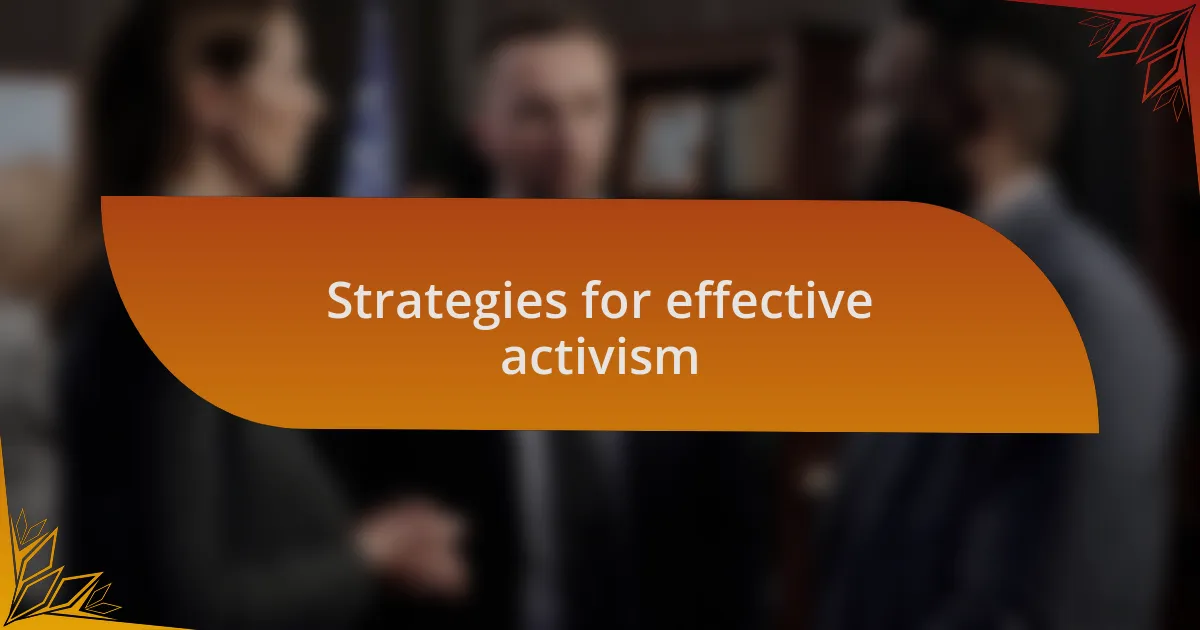
Strategies for effective activism
Effective activism requires a clear strategy, and I’ve found that building coalitions is vital. Collaborating with like-minded individuals and organizations amplifies our voices and resources. I remember attending a community meeting where diverse groups came together, sharing experiences and strategies. It was empowering to realize that our collective efforts could create ripples of change far beyond what any single person could achieve.
Another key strategy involves storytelling. When I share my experiences and the narratives of those affected by historical injustices, people often respond with greater empathy and understanding. During a rally, I recounted my grandmother’s struggle against systemic barriers. As I watched the audience’s reactions, it became evident that these personal stories made a powerful impact, igniting emotions and prompting deeper conversations about reparations.
Lastly, I believe in the importance of continuous education. Knowledge is a powerful tool in activism. I often engage in discussions, workshops, and reading sessions to deepen my understanding of the issues at hand. By equipping ourselves with facts, we can counter misinformation and confidently advocate for change. Who hasn’t felt the spark of determination after learning something new that challenges the status quo? This ongoing educational journey has only strengthened my commitment to the cause and reinforced the necessity of informed activism.
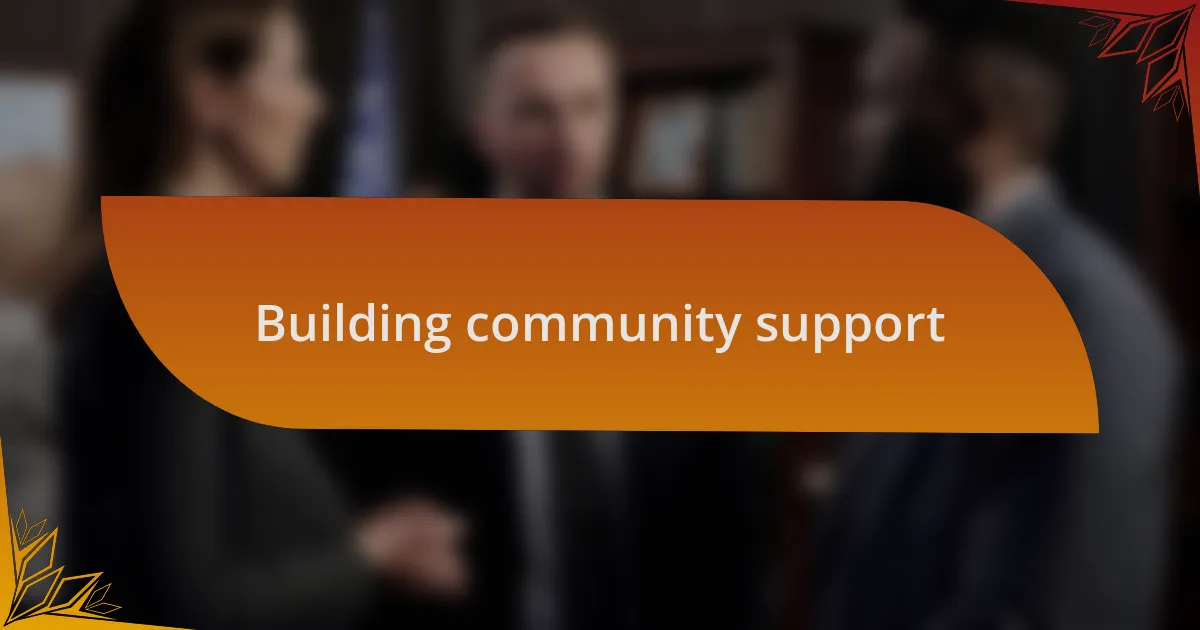
Building community support
Building community support requires reaching out and fostering genuine connections with those around us. I recall a local event where I volunteered to facilitate discussions on reparations. It was enlightening to witness how sharing differing perspectives not only encouraged open dialogue but also forged a sense of solidarity among participants who initially felt isolated in their views. Have you ever thought about how impactful those connections can be? They not only build trust but also strengthen our collective resolve.
Organizing workshops can also be an effective way to galvanize community support. I once organized a session inviting community leaders to share their insights on reparations with residents who had varying levels of awareness about the topic. It was remarkable to see people light up as they began to connect the dots between historical injustices and contemporary struggles. By involving local voices, we created an environment where everyone felt valued and empowered to contribute their thoughts, ultimately fostering a greater sense of unity.
Moreover, utilizing social media as a platform to amplify community stories is invaluable. I remember running an online campaign where residents could share personal accounts of how reparations could change their lives. The sheer volume of stories we received was moving and underscored how deeply these issues resonate. When we create spaces for people to share their experiences, it not only enriches the conversation but also builds a support network that promotes collective action. Have you ever considered sharing your own story? You might find that it resonates with others and creates a ripple effect of engagement and support.
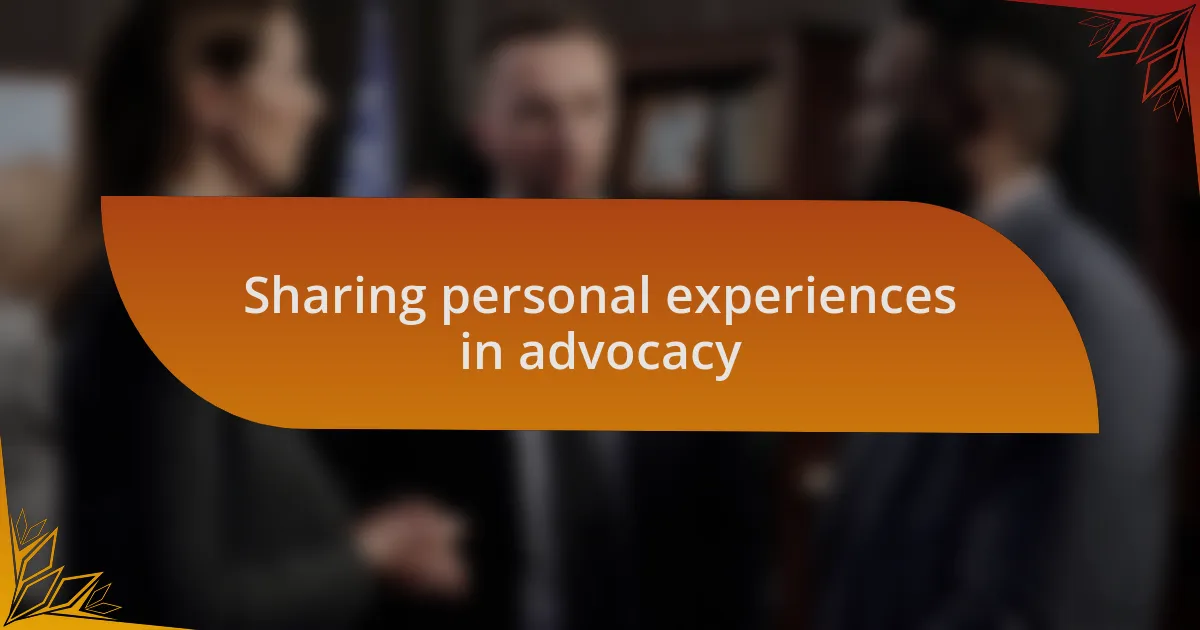
Sharing personal experiences in advocacy
Sharing personal experiences in advocacy can be one of the most powerful tools in mobilizing support for reparations. It reminds me of a time when I sat down with a group of students to discuss their thoughts on the topic. One young woman shared how her family’s story of generational poverty linked back to systemic injustices. Her heartfelt recounting not only captured the room’s attention but also sparked a profound conversation that resonated with everyone in the circle. Have you ever noticed how personal narratives can challenge perceptions and inspire empathy?
I vividly recall a community meeting where a local elder shared his life experiences shaped by racism and economic exclusion. His voice trembled, yet it was filled with passion and determination. The room was silent, hanging onto every word. It struck me how much courage it takes to expose one’s vulnerabilities in public. In that moment, I realized that sharing our stories has the potential to unify diverse voices around a common cause, transforming individual hardships into collective action. Do you think sharing personal struggles could motivate others to join the fight?
Moreover, my involvement in a documentary project focusing on reparations opened my eyes to the importance of storytelling. Listening to different community members recount their personal journeys brought tears to my eyes and ignited a renewed sense of purpose in my advocacy. I learned that these shared experiences not only inform our understanding but can ignite passion and commitment in others. It makes me wonder, what would happen if we all stepped forward to share our truths? The ripple effects might be more profound than we could ever anticipate.